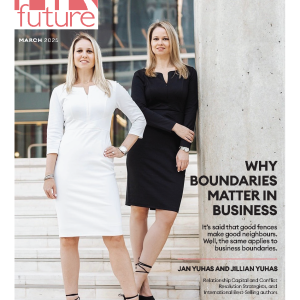“On a scale of 1 to 10, where 10 is irreversibly dead, how dead do you think you’ll be in 5, 10 or 20 years’ time?”
That’s a question I ask executives in my Age Management Masterclasses.
And after the jokes have died down, some very serious observations emerge as they confront their own mortality. None of us likes to think about the fact that there will come a time when we’ve gone as far as we’re going to go in this life, but the clock started ticking from the moment we were conceived, let alone born …
Have you also noticed people around you dying?
Over the past few years of the pandemic, peers of mine – old class mates, personal friends, work colleagues, relatives, not to mention well-known people like Barry Ronge, Jesse Duarte, Ivana Trump and others – have been dying unexpectedly. One’s first thought is, “Covid” but, if the truth be told, only one or two of those deaths were Covid-related. The vast majority died from a range of causes, some of which were possibly preventable …
But back to my first question. I refer to death on a scale of 1 to 10 because there are some people who, even though their bodies are still alive, are experiencing a form of “living death” – for example, those with debilitating mental conditions like dementia or depression, and those with debilitating physical conditions that prevent them from enjoying an active, disease-free quality of life.
While nothing in life is certain or predictable, many of these forms of “death”, whether at a level of 1 or 2 out of 10 or a final irreversible 10, could possibly have been prevented – if a start had been made a decade or so ago.
You see, you need to start looking after your health long before you need to start looking after your health. When we’re young, we think we’re bullet proof – never going to get sick, never going to die. But life happens and, before we realise it, if we haven’t been taking care of our bodies and minds, we find, too late, that certain health conditions take hold, affecting our quality of life.
So, when’s a good time to start?
If you still want to be enjoying an active quality of life in 5, 10 or 20 years’ time, you need to start doing something about it NOW. We’re all taught the importance of starting to financially invest for our old age while we’re young, but no-one tells us about investing in managing our age while we’re still young. Men are particularly bad about this. Some of them have the view that doctors are for sissies and hypochondriacs and “tough it out” when they experience certain health conditions that should serve as warning lights of danger ahead …
If you don’t invest in managing your age while you’re younger, you will age in an uncontrolled manner – you can’t expect a return on an investment you never made.
As an Age Management Coach who for the past 20 years has helped senior executives manage their age as an asset to prevent it becoming a liability, I have invested heavily in the management of my own and my wife’s ageing. Certain friends of ours have sniggered at us behind our backs. Sadly, some of those are now dead, and others are battling with health conditions which they write off as, “That’s life.” Thankfully – and I say that deliberately – we are still enjoying an excellent quality of life and feel 10 years younger than we are.
What most people fail to understand is that, today, you have to think not in terms of the old concept of “lifespan” but in terms of “healthspan”. What’s the point of living for 80 or so years when the last 20 or more of those years are miserable and isolating because of illness and debility? You should be aiming to extend your active, healthy years as long as possible and reducing the downtime due to disease as much as possible.
When you actively start to manage your age, you extend your healthspan so that you can continue to do what you enjoy doing and you push that “death” number way down to a 0, 1 or 2 out of 10.
Why die before your time in more ways than one? Some people hit that “10” death before they should have, and some experience a living death for a number of years before they finally die. Those who manage their age, however, extend their years on the planet and, just as importantly, reduce the downtime at the end of their lives so that they live full lives for as long as possible.
I want to encourage you to start extending your healthspan by starting to manage your age today. It will enable you to perform effortlessly at work, enjoy your family and friends and live a full and meaningful life way past the “sell by” date others experience in their 60s and 70s.
A number of years ago, our neighbour at the time was the CFO of a major manufacturing company. He contracted an aggressive cancer which caused rapid deterioration. His wife asked me if I would spend time with him as his friends were avoiding him because they felt uncomfortable with his condition, she said. I would pop around as often as I could and we spoke about everything – his life, his death and the plans he was making for his wife to continue with her life after his departure.
I once asked him, “What does it feel like to be told you have a certain number of months to live?”
I’m not sure if he got his answer from a Clint Eastwood movie but I’ve never forgotten what he said. His answer was, “There’s never a good day to die, but it’s going to come for all of us.”
Don’t neglect your ageing process. Today is a good day to start managing it!
If you’d like to learn more about how you and your work colleagues can manage your age, you’re welcome to contact me.
Alan Hosking is the Publisher of HR Future magazine, www.hrfuture.net and @HRFuturemag. He is an internationally recognised authority on leadership competencies for the future and teaches experienced and younger business leaders how to lead with empathy, compassion, integrity, purpose and agility. He has been an Age Management Coach for two decades. In 2018, Alan was named by US-based web site Disruptordaily.com as one of the “Top 25 Future of Work Influencers to Follow on Twitter“. In 2020, he was named one of the “Top 200 Global Power Thought Leaders to watch in 2021” by peopleHum in India. In 2022, he has been named on the Power List of the “Top 200 Biggest Voices in Leadership in 2022” by LeaderHum.













